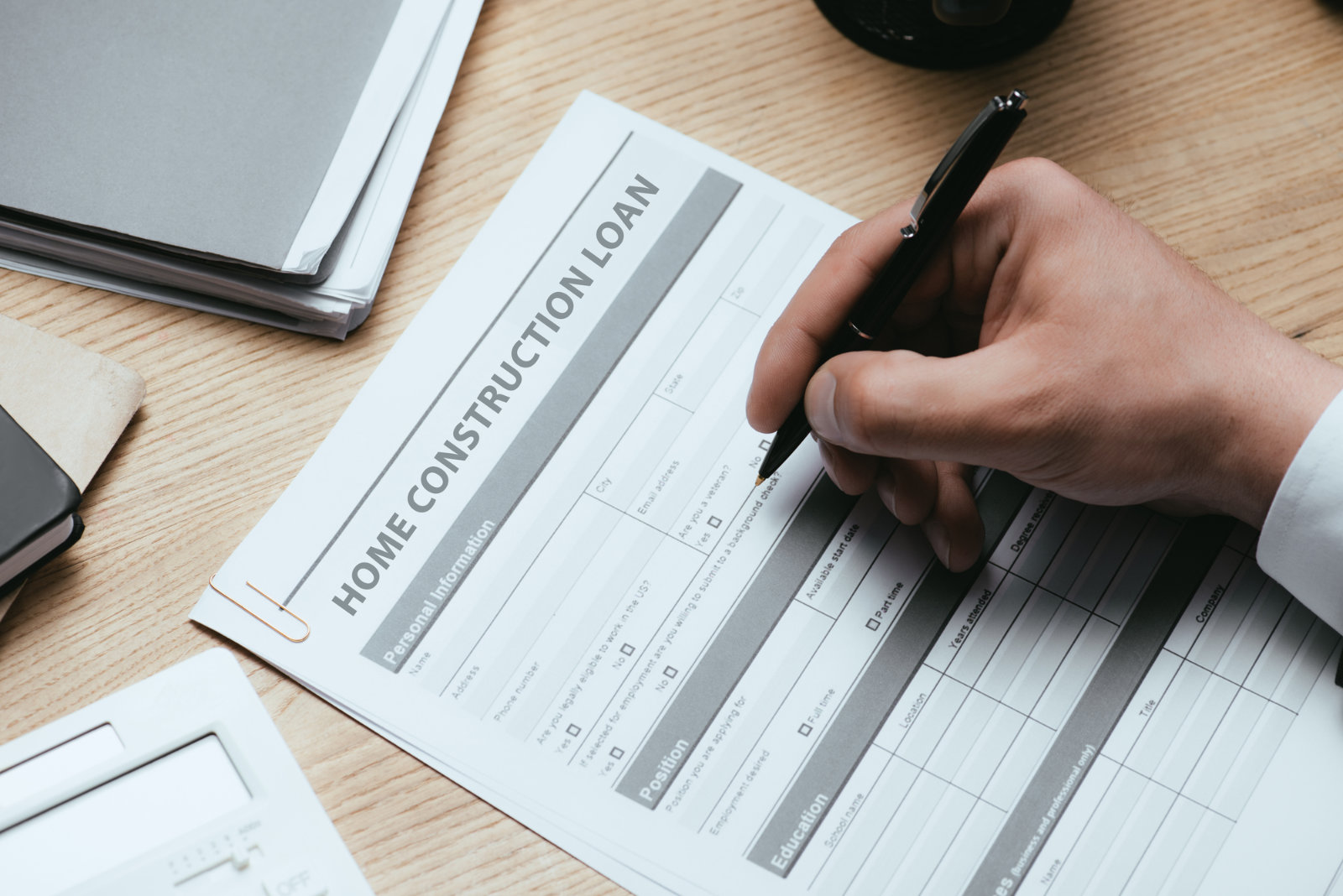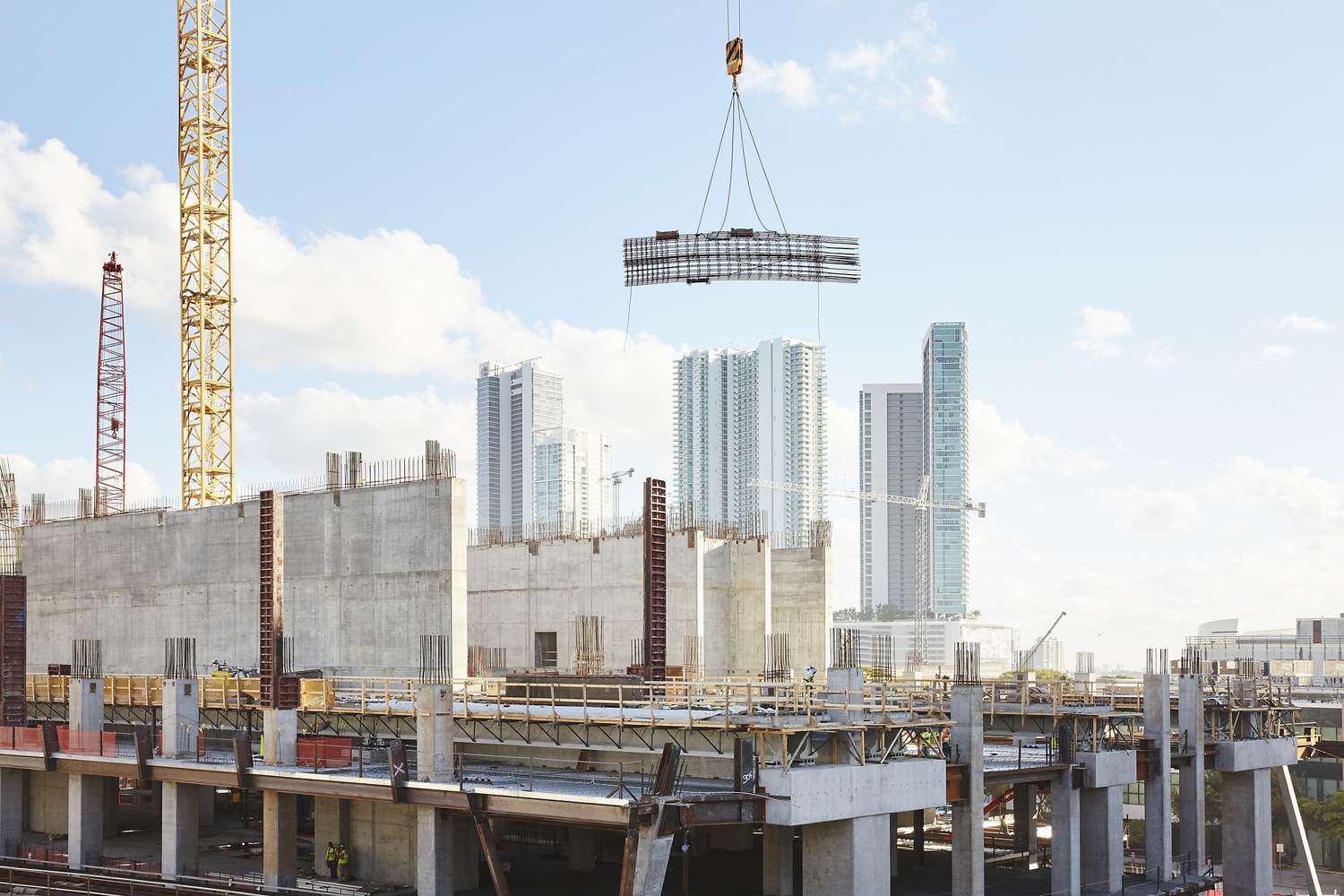Home>diy>Building & Construction>How Much Construction Loan Can I Qualify For


Building & Construction
How Much Construction Loan Can I Qualify For
Modified: March 6, 2024
Find out how much construction loan you can qualify for with our helpful guide. Get the funding you need for your building construction project.
(Many of the links in this article redirect to a specific reviewed product. Your purchase of these products through affiliate links helps to generate commission for Storables.com, at no extra cost. Learn more)
Introduction
When it comes to building your dream home, financing is often a key consideration. Construction loans provide the necessary funds to turn your vision into reality. However, before embarking on this exciting journey, it’s essential to understand how much construction loan you can qualify for.
Qualifying for a construction loan involves various factors that lenders assess to determine your eligibility. These factors include your income, credit score, down payment, construction experience, and the qualifications of your chosen builder. Understanding these criteria can help you navigate the loan application process with confidence.
In this article, we will explore the different factors that determine how much construction loan you can qualify for. By understanding these factors and working with a knowledgeable lender, you can position yourself for success in securing the loan you need to bring your construction project to life.
Key Takeaways:
- Your income, credit score, and down payment amount are crucial in determining how much construction loan you can qualify for. Lenders assess these factors to gauge your financial readiness.
- Your construction experience, builder qualifications, and the loan-to-cost ratio also impact your eligibility for a construction loan. Working with a knowledgeable lender and planning meticulously are essential for success.
Read more: How Much Of A Construction Loan Can I Get
Factors that Determine Construction Loan Qualification
Qualifying for a construction loan depends on several key factors that lenders consider during the application process. These factors help lenders assess your financial readiness and ability to repay the loan. Let’s take a closer look at the main factors that influence construction loan qualification:
- Income and Debt-to-Income Ratio: Lenders will evaluate your income to determine if it’s sufficient to cover the monthly loan payments. They will calculate your debt-to-income ratio, comparing your monthly debts to your gross monthly income. A lower debt-to-income ratio indicates a stronger financial position, increasing your chances of loan approval.
- Credit Score and History: Your credit score is a crucial factor in loan qualification. It represents your creditworthiness based on your credit history, including repayment of past debts. A higher credit score demonstrates responsible financial management and can result in more favorable loan terms and interest rates.
- Down Payment and Loan-to-Value Ratio: The amount of money you can put down as a down payment plays a significant role in construction loan qualification. Lenders typically require a percentage of the total loan amount to be paid upfront. A higher down payment can reduce the loan-to-value ratio, which is the ratio of the loan amount to the appraised value of the property. A lower loan-to-value ratio can increase your chances of loan approval and may even eliminate the need for mortgage insurance.
- Construction Experience and Builder Qualifications: Your experience in construction and the qualifications of your chosen builder can influence loan qualification. Lenders may prefer borrowers who have prior construction experience or work with reputable builders who have a proven track record. Demonstrating your knowledge and expertise in construction can provide confidence to lenders regarding project feasibility and completion.
In addition to the factors mentioned above, the loan-to-cost ratio is another crucial consideration. This ratio represents the percentage of the total cost of the project that the lender is willing to finance. Lenders typically require borrowers to provide a certain percentage of the project costs as equity. The loan-to-cost ratio may vary depending on the lender’s policies, with some allowing up to 80-90% financing.
Understanding these factors is essential as they directly impact your ability to qualify for a construction loan. It’s crucial to work closely with a knowledgeable lender who can guide you through the loan application process and help you navigate any challenges that may arise.
Income and Debt-to-Income Ratio
When it comes to construction loan qualification, your income and debt-to-income (DTI) ratio play a crucial role. Lenders evaluate these factors to determine your ability to take on additional debt and make timely monthly loan payments. Let’s explore how income and DTI ratio impact your construction loan qualification:
Income: Lenders will assess your income to ensure that it’s sufficient to cover the monthly mortgage payments. Your income can come from various sources such as employment, self-employment, investments, or rental properties. Lenders typically look for stable and reliable income sources, as this provides assurance that you can meet your financial obligations. It’s important to provide documentation, such as pay stubs, tax returns, and bank statements, to verify your income.
Debt-to-Income Ratio: The debt-to-income ratio is a key metric that lenders use to determine your financial stability and ability to manage additional debt. It compares your monthly debt obligations to your gross monthly income. To calculate your debt-to-income ratio, you add up all your monthly debt payments, including credit card payments, student loans, car loans, and existing mortgage payments, and divide that total by your gross monthly income. Lenders typically prefer a lower debt-to-income ratio, as it indicates a higher capacity to take on additional debt without straining your finances.
Every lender has their own guidelines regarding the acceptable debt-to-income ratio. In general, a lower ratio is desirable to lenders, and a ratio below 36% is considered favorable. However, different lenders may have different requirements, and some may offer flexibility based on other compensating factors.
If your debt-to-income ratio is on the higher side, there are a few strategies you can employ to improve your eligibility for a construction loan:
- Pay off existing debts: By reducing your monthly debt liabilities, you can improve your debt-to-income ratio. Consider paying off high-interest debts or consolidating multiple loans into a single, more manageable payment.
- Increase your income: If possible, try to increase your income by taking on additional work, seeking promotions or raises, or exploring other avenues for generating income. Showing a higher income can help lower your debt-to-income ratio.
- Decrease your expenses: Review your monthly expenses and identify areas where you can cut costs. This can help free up funds to pay off debts or increase your savings, ultimately improving your debt-to-income ratio.
Overall, a stable income and a healthy debt-to-income ratio are crucial factors that lenders consider when evaluating your construction loan qualification. By demonstrating a strong financial position through these factors, you can increase your chances of securing a construction loan and building the home of your dreams.
Credit Score and History
When applying for a construction loan, your credit score and credit history are critical factors that lenders consider. These elements provide insight into your past financial behavior and indicate your ability to manage debt responsibly. Let’s delve into how credit score and history impact your construction loan qualification:
Credit Score: Your credit score is a numerical representation of your creditworthiness and serves as a crucial consideration for lenders. It’s calculated based on factors such as your payment history, utilization of credit, length of credit history, types of accounts, and recent credit inquiries. A higher credit score indicates a lower level of risk for lenders, increasing your chances of loan approval and potentially securing more favorable loan terms and interest rates. On the other hand, a lower credit score may result in higher interest rates, stricter loan requirements, or even loan denial.
Credit History: Your credit history provides a detailed record of your past financial behavior. Lenders review this history to assess your ability to manage debt and make timely payments. They look for indications of responsible credit use, such as consistent on-time payments, low credit utilization, and a mix of different types of credit (e.g., credit cards, loans, etc.). A clean credit history with no bankruptcies, foreclosures, or significant delinquencies is preferable to lenders.
It’s important to obtain a copy of your credit report from each of the major credit bureaus (Equifax, Experian, and TransUnion) and review it for accuracy. Any errors or discrepancies should be addressed and corrected to ensure that your credit report accurately reflects your financial history.
While lenders have different credit score requirements, a score above 700 is generally considered good and increases your chances of loan approval. However, even if your credit score is lower, you may still qualify for a construction loan, but you may be subject to stricter requirements or higher interest rates.
To improve your credit score and enhance your chances of qualifying for a construction loan, consider the following strategies:
- Pay all your bills on time: Consistently making on-time payments is one of the most effective ways to boost your credit score over time.
- Reduce your credit utilization: Aim to keep your credit card balances below 30% of your available credit limit. Lower credit utilization demonstrates responsible credit management.
- Avoid opening new credit accounts: Opening multiple new credit accounts within a short period can negatively impact your credit score. Only apply for new credit when necessary.
- Monitor your credit report: Regularly monitor your credit report for any errors or fraudulent activity. Dispute and address any inaccuracies promptly.
- Work with a credit counseling agency: If you’re struggling with debt, working with a reputable credit counseling agency can provide guidance and assistance in managing your financial situation.
Building and maintaining a solid credit score and history is essential for construction loan qualification. By demonstrating a responsible credit track record, you can increase your chances of securing a construction loan and obtaining favorable loan terms.
Down Payment and Loan-to-Value Ratio
The down payment and loan-to-value (LTV) ratio are significant factors in determining your qualification for a construction loan. These elements relate to the amount of money you contribute upfront and the percentage of the total project cost that the lender is willing to finance. Let’s explore how the down payment and LTV ratio influence your construction loan qualification:
Down Payment: The down payment is the initial amount of money you contribute towards the project cost. It represents your investment in the construction project and is typically a percentage of the total loan amount. The required down payment can vary from lender to lender but generally ranges from 20% to 25% of the project cost. Providing a substantial down payment demonstrates your commitment to the project and lowers the lender’s risk. Moreover, a larger down payment can lower the loan amount, resulting in potentially lower monthly payments and interest rates.
Loan-to-Value Ratio: The loan-to-value ratio is the percentage of the loan amount in relation to the appraised value of the property or the total project cost. For example, if the appraised value of the property is $500,000 and the loan amount is $400,000, the LTV ratio is 80%. Generally, lenders prefer to keep the LTV ratio below a certain threshold. While different lenders have different LTV requirements, a ratio below 80% is often preferred. A lower LTV ratio indicates a lower amount of risk for the lender and can increase your chances of loan approval.
It’s important to note that the down payment and LTV ratio are interconnected. The larger the down payment you provide, the lower the LTV ratio will be, improving your qualifications for a construction loan. A lower LTV ratio may also allow you to avoid additional costs, such as private mortgage insurance (PMI), which is typically required when the LTV ratio exceeds 80%.
If you’re concerned about meeting the down payment requirements, consider the following options:
- Saving: Start saving early and set aside a portion of your income specifically for the down payment. Open a separate savings account to keep track of your progress.
- Selling assets: Consider selling any assets, such as stocks, bonds, or even property, to generate funds for the down payment.
- Gifts or loans from family or friends: If permissible by the lender, you may be able to receive a monetary gift or loan from a family member or friend to help with the down payment. Ensure that you abide by any gift or loan documentation requirements set by the lender.
- Government assistance programs: Look into government-backed programs that assist first-time homebuyers. These programs often have more flexible down payment requirements.
Remember, the down payment and loan-to-value ratio are crucial factors in securing a construction loan. By providing a substantial down payment and maintaining a lower LTV ratio, you can increase your chances of loan approval and potentially enjoy more favorable loan terms and interest rates.
To determine how much construction loan you can qualify for, consider factors such as your credit score, income, and debt-to-income ratio. Lenders typically look for a credit score of 680 or higher and a debt-to-income ratio of 45% or lower.
Read more: What Is A Commercial Construction Loan
Construction Experience and Builder Qualifications
When it comes to construction loan qualification, your level of construction experience and the qualifications of your chosen builder are important factors that lenders consider. These elements provide an understanding of your ability to successfully complete the construction project. Let’s delve into how construction experience and builder qualifications impact your loan qualification:
Construction Experience: Lenders may prefer borrowers who have prior experience in the construction industry. Your construction experience demonstrates familiarity with the intricacies of the construction process, the ability to estimate project costs accurately, and the knowledge to manage construction timelines effectively. If you have a strong construction background, it can provide confidence to the lender that your project is feasible and will be completed successfully. However, lacking construction experience does not necessarily disqualify you from obtaining a construction loan. Other factors, such as the qualifications of your chosen builder, can compensate for that.
Builder Qualifications: The qualifications and reputation of your chosen builder play a significant role in construction loan qualification. Lenders prefer builders who have a proven track record of successfully completing similar projects on time and within budget. They may consider factors such as the builder’s experience, licensing, certifications, and professional affiliations. Choosing a reputable and qualified builder adds credibility to your construction project, reassuring lenders that it will be executed professionally and efficiently. It also helps mitigate the risks associated with construction delays or cost overruns.
If you don’t have construction experience or haven’t selected a builder yet, consider the following strategies to enhance your loan qualification:
- Research potential builders: Take the time to research and interview potential builders. Ask for references, review their portfolio of completed projects, and inquire about their certifications and qualifications. Choosing a builder with a solid reputation can increase your chances of loan approval.
- Work with a licensed general contractor: If you don’t have construction experience, consider working with a licensed general contractor who can oversee the construction project on your behalf. Lenders may be more willing to approve your loan if you have a qualified professional managing the construction process.
- Provide detailed project plans and cost estimates: Presenting comprehensive and well-developed project plans, including detailed cost estimates, can demonstrate your preparation and understanding of the project. This can help instill confidence in lenders regarding the successful completion of the construction project.
- Obtain multiple bids: Get bids from multiple contractors or subcontractors to ensure competitive pricing. This will provide lenders with a realistic cost assessment and increase confidence in the project’s financial feasibility.
While construction experience and builder qualifications are factors that lenders consider, don’t be discouraged if you lack direct experience. Working with a reputable builder, providing robust project plans, and demonstrating your commitment to the project can compensate for any potential gaps in experience. Collaboration with an experienced professional can help you navigate the construction loan application process more smoothly.
The Role of the Loan-to-Cost Ratio
The loan-to-cost (LTC) ratio is a crucial factor in construction loan qualification. It represents the percentage of the total project cost that the lender is willing to finance. Understanding the role of the LTC ratio can help you plan your construction project effectively and secure the necessary financing. Let’s explore the significance of the LTC ratio in construction loan qualification:
Project Financing: The LTC ratio determines the amount of funding the lender is willing to provide for your construction project. For example, if the total project cost is $500,000 and the lender’s LTC ratio is 80%, they would be willing to finance up to $400,000 (80% of the project cost). As the borrower, you would be responsible for contributing the remaining 20% as a down payment or equity in the project.
Lender’s Risk Assessment: The LTC ratio serves as a risk assessment tool for the lender. A lower LTC ratio indicates a higher contribution from you, the borrower, reducing the lender’s risk exposure. This can increase your chances of loan approval. On the other hand, a higher LTC ratio puts more financial responsibility on the lender, which may make them more hesitant to provide the loan, require stricter qualifications, or result in less favorable loan terms.
Construction Feasibility: The LTC ratio also helps lenders assess the feasibility of the construction project. By comparing the loan amount to the total project cost, lenders can evaluate if the requested loan aligns with the scope and value of the project. Lenders typically want to ensure that the loan amount is reasonable in relation to the project’s potential value upon completion.
It’s important to note that the LTC ratio is different from the loan-to-value (LTV) ratio. While the LTV ratio compares the loan amount to the appraised value of the property, the LTC ratio considers the loan amount in relation to the total project cost, including land acquisition, construction expenses, permits, and other associated costs.
To ensure a favorable LTC ratio and increase your chances of securing a construction loan, consider the following strategies:
- Thoroughly research and estimate project costs: Conduct a comprehensive analysis of all anticipated costs associated with the construction project. This includes land acquisition, architectural and engineering fees, permits, construction materials, labor costs, landscaping, and any other project-specific expenses. Accurate cost estimates will help you determine the loan amount needed and ensure your loan request aligns with the project’s scope.
- Obtain multiple cost estimates: Seek quotes from different contractors or subcontractors to compare pricing. This will give you a better understanding of the potential cost range for your project and enable you to negotiate better terms.
- Prepare a detailed project plan: Provide a well-developed project plan that highlights the steps involved in the construction process and demonstrates your understanding of the project timeline and potential challenges. A robust project plan can instill confidence in lenders regarding the feasibility of your construction project.
By understanding the role of the loan-to-cost ratio and carefully planning your construction project, you can position yourself for a successful loan application. It’s advisable to work closely with a knowledgeable lender who can guide you through the loan process and help you navigate any challenges along the way.
Pre-Approval and Loan Amount Calculation
Before starting your construction project, it’s crucial to go through the pre-approval process with a lender. Pre-approval helps determine the loan amount you can qualify for and provides you with a clear understanding of your financial capabilities. Let’s explore how pre-approval works and how the loan amount is calculated for a construction loan:
Pre-Approval Process: During the pre-approval process, you provide the lender with detailed information about your finances, including your income, debts, assets, and credit history. The lender evaluates this information to assess your creditworthiness and ability to repay the loan. Based on their evaluation, they provide you with an estimate of the loan amount you may qualify for, along with the associated terms and conditions.
Loan Amount Calculation: To calculate the loan amount for a construction loan, lenders typically consider a variety of factors, including:
- Projected project cost: Lenders assess the total cost of the construction project, including land acquisition, construction expenses, permits, fees, and any other relevant costs. They will also consider any contingency budget set aside for unforeseen expenses.
- Down payment: The down payment is a crucial factor in loan amount calculation. Lenders may require a certain percentage of the total project cost to be paid as a down payment. Your down payment reduces the loan amount, and the lender will finance the remaining portion.
- Loan-to-Value Ratio: The loan-to-value (LTV) ratio, which compares the loan amount to the appraised value of the property, also impacts the loan calculation. Lenders typically have a maximum LTV ratio they are willing to finance. For example, if the lender’s LTV ratio is 80%, they would finance up to 80% of the appraised value of the property or the total project cost.
- Income and Debt-to-Income Ratio: Your income and debt-to-income (DTI) ratio play a role in loan amount calculation. Lenders need to ensure that your income is sufficient to cover the monthly loan payments, and they consider your DTI ratio to assess your ability to take on additional debt.
- Credit Score: Your credit score and credit history influence the loan amount calculation. A higher credit score may result in a higher loan amount and more favorable loan terms.
Based on these factors, the lender will determine the loan amount you qualify for. However, it’s important to note that the actual loan amount you receive may depend on the final appraised value of the property and any adjustments made during the underwriting process.
Working with a knowledgeable lender who specializes in construction loans is essential during the pre-approval process. They can guide you through the necessary documentation, financial assessments, and calculations, providing you with a clear understanding of the loan amount you can expect and any specific requirements related to your construction project.
Remember, pre-approval is a crucial step in the construction loan process as it helps you determine your financial capabilities and sets realistic expectations for your project. It allows you to plan your construction project effectively and move forward with confidence.
Conclusion
Navigating the world of construction loans can be complex, but understanding the factors that determine your loan qualification is crucial to your success. By considering key elements such as income, credit score, down payment, construction experience, builder qualifications, and the loan-to-cost ratio, you can position yourself for a successful loan application. Working with a knowledgeable lender who specializes in construction loans can provide valuable guidance and support throughout the process.
Your income and debt-to-income ratio play a significant role in loan qualification. Lenders assess your income to ensure it’s sufficient to cover the monthly loan payments, while a lower debt-to-income ratio demonstrates financial stability. Building a solid credit score and history is equally important. A higher credit score can increase your chances of loan approval and secure more favorable loan terms.
The down payment and loan-to-value ratio determine the amount of money you contribute upfront and the percentage of the total project cost that the lender is willing to finance. Providing a substantial down payment and maintaining a lower loan-to-value ratio can enhance your qualifications and potentially lead to better loan terms.
Construction experience and builder qualifications are also influential factors. Lenders may prefer borrowers with construction know-how or reputable builders with a proven track record. These factors provide lenders with confidence in the successful completion of your construction project.
Finally, understanding the role of the loan-to-cost ratio and going through the pre-approval process with a lender are essential steps. The loan-to-cost ratio determines the funding the lender is willing to provide, while pre-approval gives you clarity about your loan amount and financial capabilities.
In conclusion, by considering and addressing the factors that determine your construction loan qualification, you can increase your chances of securing the necessary financing for your dream home. Working with a knowledgeable lender, conducting thorough research, and planning your project meticulously will set you on the path to a successful construction loan application and the realization of your vision.
Frequently Asked Questions about How Much Construction Loan Can I Qualify For
Was this page helpful?
At Storables.com, we guarantee accurate and reliable information. Our content, validated by Expert Board Contributors, is crafted following stringent Editorial Policies. We're committed to providing you with well-researched, expert-backed insights for all your informational needs.















0 thoughts on “How Much Construction Loan Can I Qualify For”